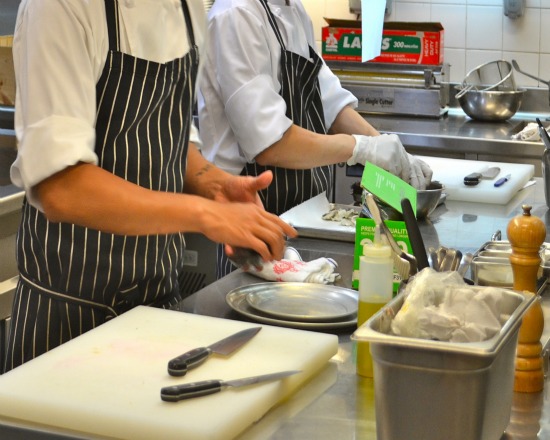
The Restaurant Opportunities Center of New York (ROC-NY) is holding its first-ever restaurant week. But it’s not like the NYC Restaurant week we’re used to here in New York. This is High Road Restaurant Week, and it’s about “generation of interest and exposure for the restaurants that are currently doing the right thing,” said Steven Picker, chef at Good Restaurant and member of the ROC-NY Restaurant Industry Roundtable.
High Road Restaurants are restaurants that meet ROC-NY-set standards for ethical workplace practices, conditions and treatment of restaurant staff. That means paid sick days and time off for employees, a respectful work environment, health care, available training and promotions, as well as compliance with “with city, state and federal laws governing employment, as well as requirements set forth by the NYC Department of Health and Mental Hygiene and the Occupational Safety and Health Administration (OSHA),” according to the High Road website.
That’s just the minimum — but that’s what it takes to have an ethical workplace, said Picker. And most restaurants don’t meet these standards. In a city as obsessed with dining out as New York, only 37 restaurants in Manhattan and Brooklyn have been awarded the High Road distinction.
Even as consumers have become more aware of what’s on their plates, not much attention has been paid to the people in the kitchen. “There’s been an incredible promotion of what’s on the plate,” said Picker. “It’s been phenomenal for restaurants and for food in general, but it’s skipped a vital element of what goes into that food” — the community of people handling the food.
Why? “I think it’s a completely non-sexy subject. There’s no downside to talking about how we need delicious, local food,” said Picker, citing the farm to table movement. “But I don’t think people want to go into a restaurant and think about, ‘How are you taking care of your workers? Are they getting paid work days? Are they being promoted? Are they being given anything more than the bare requirements, so that your business can make money but the community inside the restaurant is hardly functioning?’” That’s kind of a drag, he said. After all, you might find out that you need to rethink the restaurants you love so much.
But there are a lot of places that are doing the right thing, that do meet the High Road standards — and that’s what High Road Restaurant Week is all about. Picker and the rest of the Roundtable, which is responsible for planning the week, want New Yorkers (and everyone else) to involve themselves more deeply in the experience of eating out. “This is meant to say, ‘If you have not thought about this aspect of the food business before, this is what’s going on.’ It’s an introduction to the subject.”
And beyond the 37 restaurants recognized as High Road Restaurants, Picker urged restaurant-goers to “become a little more conscious and a little more active in looking at the overall experience of what goes into feeding them.”
Asking questions is the best way to get involved, he said. “Whether it’s a Starbucks or a Korean deli or a fine dining restaurant — especially in a fine dining restaurant, where you think it must be good because the waitstaff looks so nice and everything smells so good. But are they being treated correctly?”
Ultimately, Picker hopes that High Road Restaurant Week will help build momentum and awareness for workers’ rights inside the kitchen. “These things really affect the safety, health and social aspects of a working environment. These are just the givens — and they’re not always given!” he said. “It’s hard to convince the heads of these businesses in which there’s already enormous overhead and a small profit margin that these are things they need to be worried about. It needs to be built into the business model.” The more people that are aware of current working conditions, the need for change and the restaurants that are already committed to treating their workers well, the more pressure there will be for restaurants to meet High Road standards.
And what better place to do it than New York? “In a city like New York, it seems like everyone wants to voice their opinions,” said Picker. “I feel that we can teach people to start asking more than what’s on their plate.”
High Road Restaurant Week will be April 23-30. Visit their website for more information.
Feature photo: Flickr/Sarah_Ackerman



